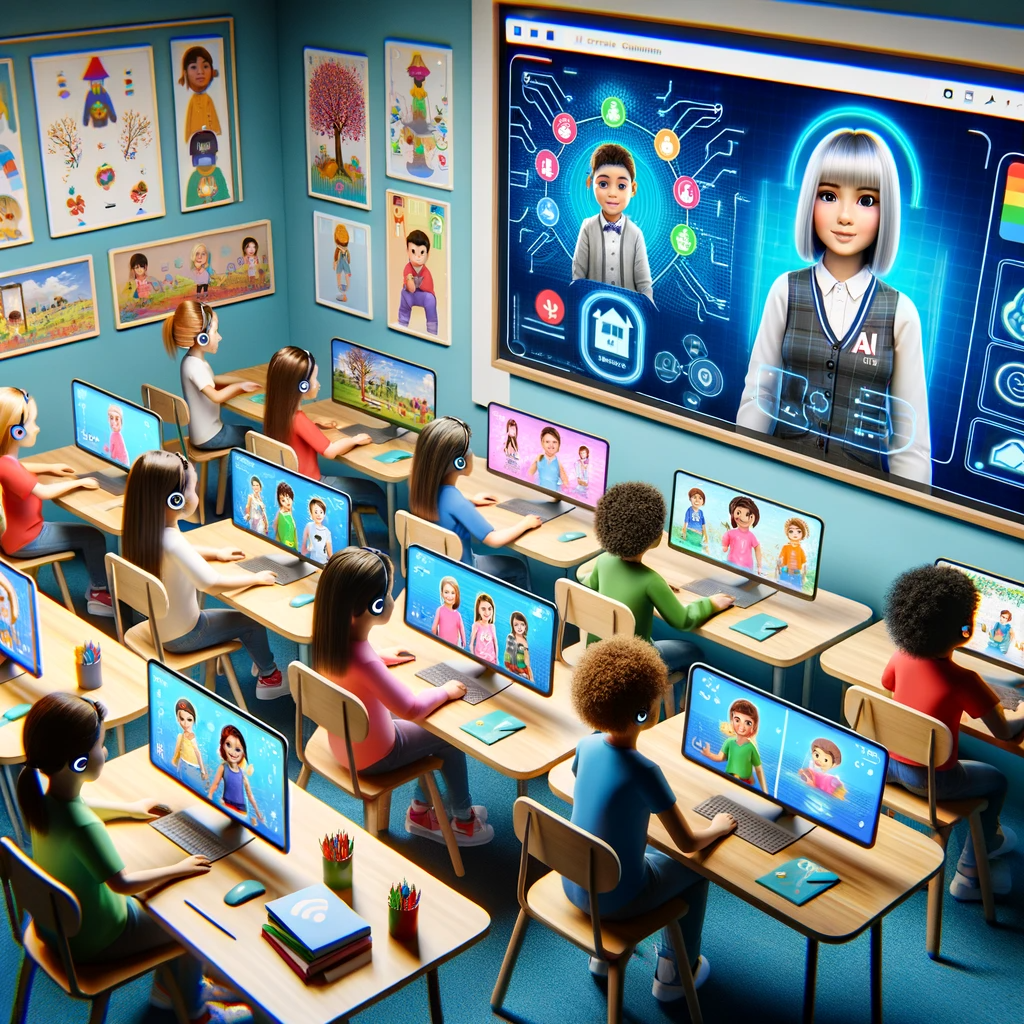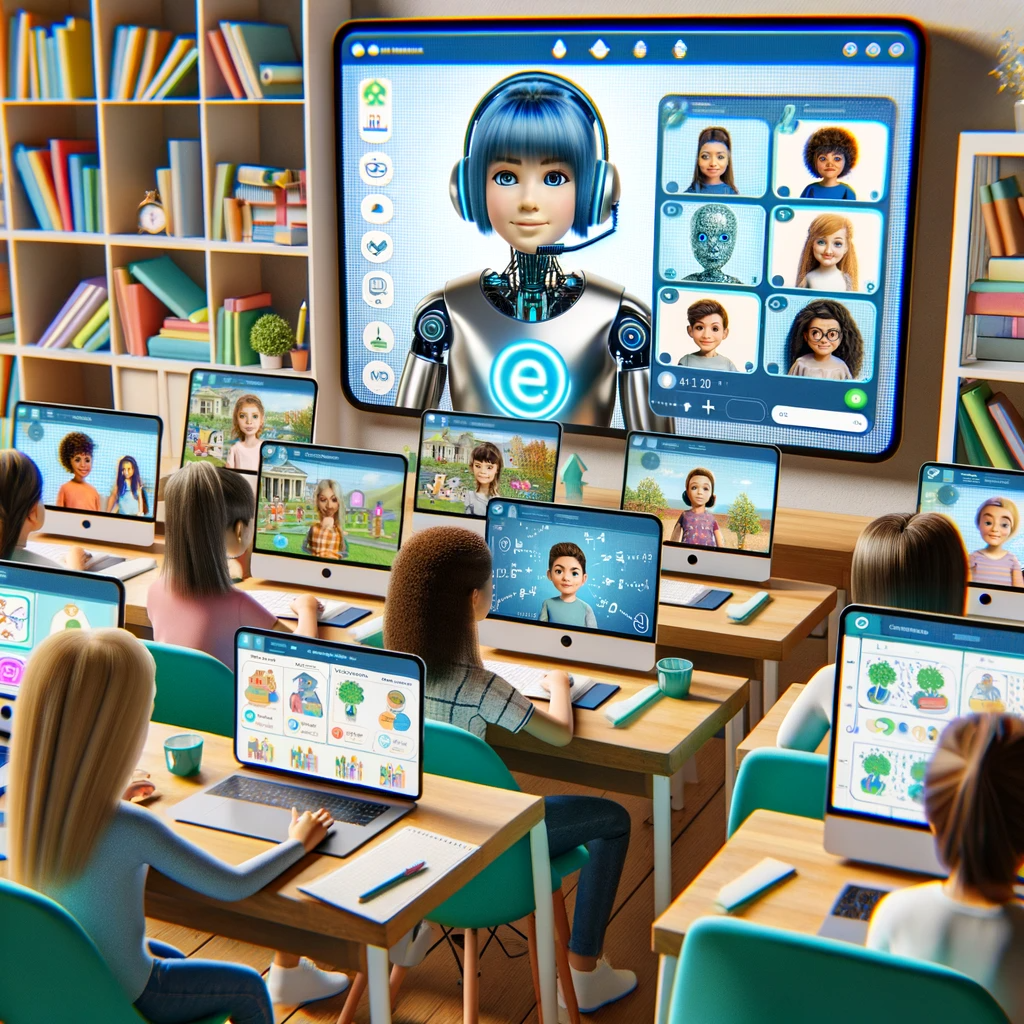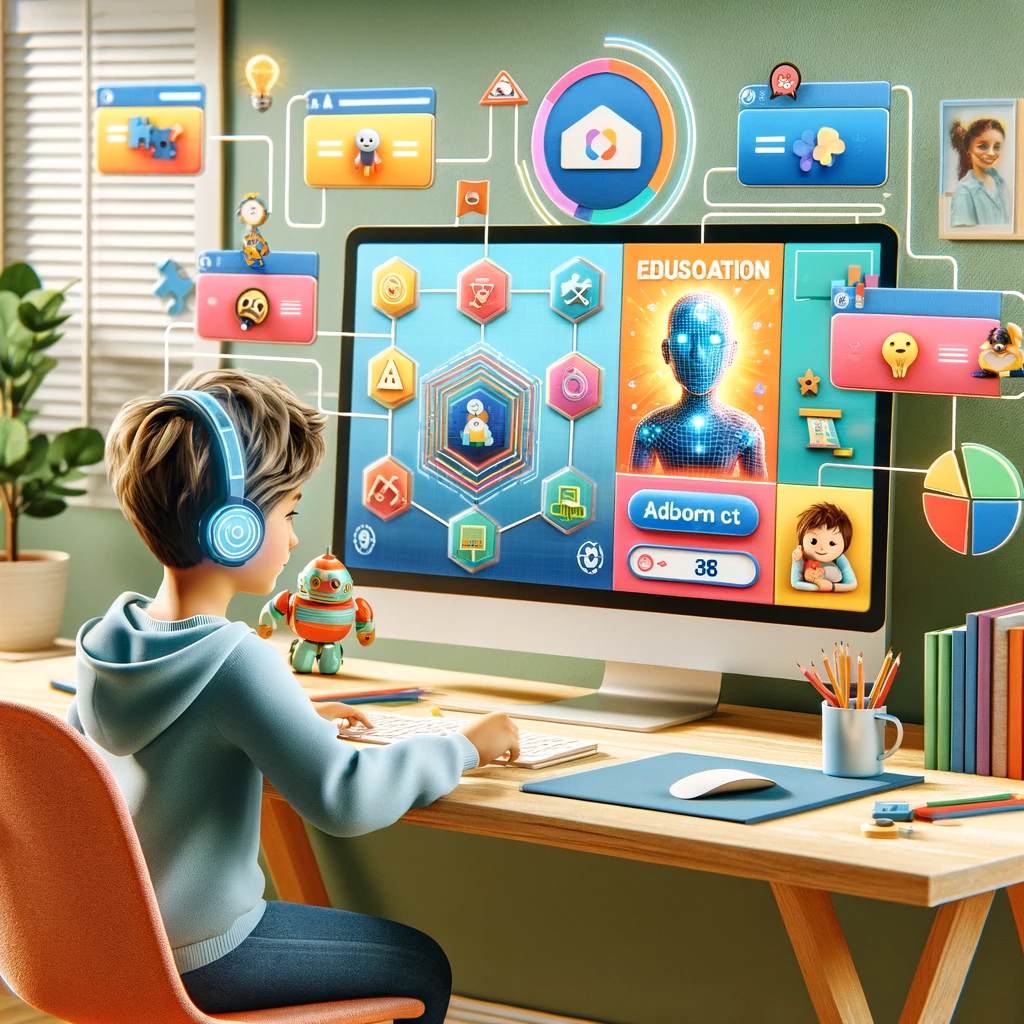In today’s rapidly evolving digital age, the landscape of education is undergoing a profound transformation. As traditional classroom settings give way to online and remote learning platforms, educators and parents alike are exploring innovative ways to ensure that children receive a quality education tailored to their unique needs and abilities. At the heart of this educational revolution is Artificial Intelligence (AI), a technological force that promises to reshape the way children learn and acquire knowledge. The central question that looms large in this discourse is whether AI holds the key to the future of personalized online learning for children. Can AI-driven personalized education not only meet the diverse needs of young learners but also pave the way for a more effective, engaging, and equitable educational experience? In this article, we embark on a journey to explore the dynamic intersection of AI and education, delving into how AI is poised to revolutionize the learning landscape for children and the challenges it brings to the forefront. Join us as we navigate this fascinating realm, aiming to understand if AI truly stands as the beacon guiding the future of personalized online learning for our youngest generation.
The Changing Landscape of Education
Traditional vs. Digital Education
In the not-so-distant past, education primarily took place within the confines of physical classrooms, where students gathered to learn under the guidance of teachers. However, the advent of digital technology has ushered in a new era of education. Traditional brick-and-mortar classrooms are increasingly being complemented, or even replaced, by online learning platforms. The transition from traditional to digital education has been accelerated by various factors, including advancements in technology, the need for remote learning during unprecedented times, and the recognition that one-size-fits-all education often falls short in meeting the diverse needs of students.
The Need for Personalized Learning
The shortcomings of one-size-fits-all education have become increasingly evident. Not all students learn at the same pace or in the same way. Some may excel in certain subjects while requiring additional support in others. This recognition of the individuality of each student’s learning journey has fueled the demand for personalized learning experiences. Personalized learning acknowledges that children have unique strengths, weaknesses, interests, and learning styles. It aims to cater to these individual differences by tailoring educational content and methods to each student’s specific needs, maximizing their potential for academic success.
The Role of AI in Personalized Learning
Understanding Artificial Intelligence in Education
Artificial Intelligence (AI), often hailed as the cornerstone of the Fourth Industrial Revolution, has found a significant role in the field of education. In essence, AI refers to the development of computer systems that can perform tasks typically requiring human intelligence, such as learning, reasoning, problem-solving, and decision-making. When applied to education, AI brings forth a range of capabilities, from automating administrative tasks to enhancing the learning process itself. It opens up new possibilities for the creation of personalized learning environments that adapt to each student’s unique requirements.
Adaptive Learning Systems
A central pillar of AI in personalized online learning is adaptive learning systems. These systems leverage AI algorithms to assess students’ progress, strengths, and weaknesses in real-time. By continuously analyzing students’ responses to various learning activities and assessments, adaptive systems can adjust the difficulty, pace, and content of lessons to match the individual student’s level of comprehension and mastery. The result is a learning experience that evolves alongside the student, ensuring that they neither fall behind nor feel overwhelmed, thus optimizing their learning outcomes.
In the subsequent sections of this article, we will delve deeper into the benefits of AI in personalized learning, examine AI-powered educational tools, explore potential challenges and concerns, showcase success stories, and gaze into the future of education where AI plays a pivotal role. Through this exploration, we aim to provide a comprehensive understanding of whether AI truly stands as the harbinger of personalized online learning for children, and what the implications are for the future of education as we know it.

Benefits of AI in Personalized Learning
Customized Learning Paths
One of the remarkable advantages of AI-driven personalized learning is the ability to create customized learning paths for each student. Traditional education often employs a uniform curriculum, leaving some students struggling with concepts they find challenging, while others become disengaged due to material that is too easy for them. AI algorithms can analyze a student’s performance and preferences to generate a learning journey tailored precisely to their needs. This customization not only enhances comprehension but also fosters a sense of empowerment, as students can see their progress and achievements more clearly.
Real-time Feedback and Assessment
AI’s ability to provide instantaneous feedback and assessment is another compelling feature. In traditional settings, students typically receive feedback from teachers after assignments or exams, which can sometimes result in delayed corrective measures. With AI, assessment and feedback occur in real-time. As students engage with educational content, AI systems evaluate their responses, identify areas of improvement, and offer guidance or additional resources immediately. This real-time feedback loop not only accelerates learning but also allows educators to intervene more effectively when students encounter challenges.
AI-Powered Educational Tools
Intelligent Tutoring Systems
Intelligent Tutoring Systems (ITS) represent a pivotal component of AI in personalized learning. These systems employ AI algorithms to provide students with individualized support and guidance. ITS can offer explanations, hints, and practice problems tailored to a student’s current level of understanding. They adapt in response to students’ performance, ensuring that learning remains challenging yet achievable. ITS is particularly valuable for children who require additional help in specific subjects or topics, as it provides a personalized tutor available 24/7.
Educational Chatbots and Virtual Assistants
Educational chatbots and virtual assistants powered by AI have gained popularity as they enhance students’ access to information and support. These friendly digital companions can answer questions, explain concepts, and assist with homework assignments. Moreover, they adapt their responses based on the individual student’s knowledge level, providing explanations that are neither too simplistic nor overly complex. Chatbots and virtual assistants offer a convenient and engaging way for children to interact with educational content outside of the classroom.
Challenges and Concerns
Data Privacy and Security
While AI in education holds enormous promise, it also raises concerns regarding data privacy and security, especially when it comes to children. AI systems gather a significant amount of data about students’ learning habits, preferences, and performance. Protecting this data from breaches and ensuring it is used ethically is of paramount importance. The article will delve into the measures and regulations in place to safeguard children’s privacy in AI-driven education.
Equity and Accessibility
The implementation of AI-powered personalized learning should not exacerbate educational inequalities. Access to technology and high-quality internet connections can be unevenly distributed, leaving some students at a disadvantage. Addressing these disparities and ensuring that AI-enhanced education is accessible to all children, regardless of their socioeconomic background or geographical location, is a vital aspect of the discussion.
In the upcoming sections, we will present success stories and case studies showcasing how AI has positively impacted children’s education, provide insights from educators and students, and discuss the evolving landscape of education with AI at the forefront. Ultimately, this exploration aims to offer a nuanced perspective on the role of AI in personalized online learning for children and its potential to shape the future of education.
Success Stories and Case Studies
Examples of AI-Enhanced Education
To illustrate the practical applications and benefits of AI in personalized online learning for children, this section will present real-world examples and case studies. It will showcase schools, platforms, or initiatives that have successfully implemented AI-driven personalized learning, emphasizing measurable improvements in student outcomes, engagement, and overall educational experiences.
Testimonials from Educators and Students
Anecdotal evidence can be powerful in understanding the impact of AI in education. In this section, we will include quotes and testimonials from educators and students who have experienced AI-powered personalized learning. Educators can share their perspectives on how AI has enhanced their teaching methods, while students can provide insights into how AI has influenced their learning journeys, making education more engaging and effective.
The Future of Education with AI
The Evolution of AI in Education
AI’s journey in education is dynamic and evolving. This section will explore the trajectory of AI in education, from its early applications to the emerging trends and technologies that are shaping the future. It will discuss how AI has the potential to not only personalize learning but also revolutionize the entire educational ecosystem.
The Human Element in Education
While AI plays a pivotal role in personalized online learning for children, it is essential to emphasize the irreplaceable value of human educators. This section will discuss the symbiotic relationship between AI and teachers, highlighting how educators can leverage AI as a tool to enhance their teaching methods and better meet the diverse needs of their students. It will emphasize that AI is a complement, not a substitute, for human expertise and guidance in education.

Conclusion
In conclusion, the intersection of AI and education holds the promise of reshaping the way children learn and acquire knowledge. The journey through the changing landscape of education, the role of AI in personalized learning, its benefits, challenges, and real-world success stories, brings us to a nuanced understanding of whether AI stands as the beacon guiding the future of personalized online learning for children.
While AI offers remarkable potential, it is not without its complexities and ethical considerations, particularly regarding data privacy and equity in education. As we look ahead to the future of education with AI, it is crucial to strike a balance that leverages technology’s strengths while preserving the human element that makes education a holistic and transformative experience.
The answer to whether AI is the future of personalized online learning for children lies in a dynamic and collaborative educational landscape where technology and human expertise work hand in hand. The true measure of success in AI-enhanced education is its ability to empower every child, regardless of their background, to embark on a unique and fulfilling learning journey.
